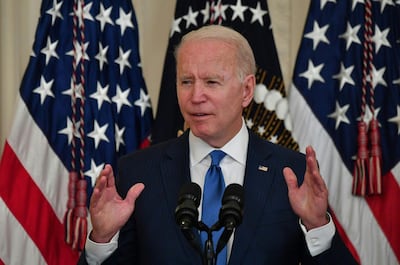When US President Joe Biden makes a mistake it is significant and these days, unexpectedly, surprising.
After four years of extraordinary missteps and blunders by Donald Trump and his administration, at least in terms of governance if not populist politics, Joe Biden has appeared remarkably adroit at avoiding self-inflicted wounds. That is unexpected because in his eventful 40-year political career, Mr Biden has been prone to gaffes and malapropisms.
But in his political campaigns last year and as president this year, a very different Mr Biden has emerged. He has been remarkably cautious and disciplined, well protected by the Democratic political apparatus surrounding him, and has limited unscripted public appearances.
He and his team are clearly aware that, to be an effective president, he needs to escape the tendency to let inanities slip, especially to strike a marked contrast with Mr Trump.
Mr Biden scored a major early success with a giant pandemic economic recovery bill. In order to avoid the congressional losses first-term presidents generally suffer, and which he cannot afford, he needs another major legislative accomplishment before next year's midterms.
The two main initiatives are on infrastructure funding and voting rights.
If Democrats can stick together they have 50 votes out of 100, and Vice President Kamala Harris can then break the 50-50 tie. But that won't help the Democrats on voting legislation.
Republicans are united in refusing to allow the Democrats’ original voting protection bill from even coming to debate in the Senate, let alone passing, both of which require 60 and not 50 or 51 votes.
Infrastructure seemed more promising given that some Republicans might be tempted to claim credit for supporting a popular major spending programme. Under the budget "reconciliation" exception, certain spending measures can be passed by a simple Senate majority.
The Senate Parliamentarian, a non-partisan official who adjudicates Senate rules, concluded that even though the Democrats relied on reconciliation to pass the coronavirus spending package, they could do it again this year on infrastructure.
It is not yet clear what parts of proposed infrastructure legislation could be adopted on a strict, party-line 50-51 vote, but a significant package undoubtedly could.
Most Democrats have soured on the idea of negotiating with Republicans, particularly after former president Barack Obama spent many months negotiating his proposed healthcare legislation with Republican senators, only to have them eventually admit that they were not prepared to agree to anything and had simply been wasting time.
Nonetheless, Mr Biden has been promoting bipartisanship, along with two key Democratic senators, Joe Manchin of West Virginia and Kyrsten Sinema of Arizona. Since Democrats can't pass anything without their support, their influence has been greatly magnified.
Most Democrats, for example, are keen on abolishing or at least revising the filibuster. They could do that with just 51 votes, but they don't have them because of opposition by Mr Manchin and Ms Sinema.
Mr Biden’s intensive infrastructure negotiations with Republican senators exasperated many Democrats.
But he was following his own inclinations, pleasing these two crucial senators, and exploring what, if anything, Republicans might agree to that either couldn't be passed through reconciliation or could be touted as a historic corrective to the extreme polarisation.
Last week, he seemed to achieve a major breakthrough. Ten senators, five Republicans and five Democrats, agreed on a $1.2 trillion, eight-year infrastructure spending programme.
It would not give Democrats everything they sought, especially on family issues like child and elder care, but still is a vast initiative.
It was not clear if five additional Republicans might vote for the bill, but the president appeared vindicated: bipartisan agreements are still possible.
Then Mr Biden made his first major presidential misstep. He declared he would not sign such a bill unless there was accompanying legislation for more spending passed by Democrats alone.
Republicans howled in outrage, though they knew all along Democrats would certainly seek additional spending through reconciliation. Mr Biden had to clarify that he would indeed simply sign such a bill if it passed.
But the uproar will complicate efforts to find five more Republican votes. It is possible Mr Biden was deliberately trying to signal to the Democratic left that their concerns were not being abandoned. Either way, linking the bills produced nothing but a new set of problems.
Yet it was never clear if five or any more Republicans are willing to support any major initiative that could aid Mr Biden.
A parallel dynamic on bipartisanship is developing over voting rights.
Republicans unanimously blocked wide-ranging legislation proposed by Democrats.
Mr Manchin, who said he would not support that bill, has proposed a more modest package that nonetheless includes many important protections. Crucially, it was endorsed by some of the most influential voting-rights activists, most notably the beloved Stacey Abrams of Georgia.
Her intervention united Democrats and will therefore test Republican intentions on Mr Manchin’s proposed compromise.
Republicans face two upcoming tests of whether they are willing to pass any momentous legislation at all with a Democratic president: the existing infrastructure agreement and a scaled-down voting protection bill.
If Republicans refuse to co-operate on both in coming weeks, Mr Biden's domestic agenda will be damaged and deal-making efforts crushed, although Democrats will pass what they can on infrastructure through the reconciliation process.
The current 7 per cent economic growth rate might ensure that Democrats survive the midterms anyway.
But at some point, championing bipartisanship in the face of unbending opposition on all aspects of governance by the other side becomes unworkable and indefensible.
If Republicans are determined to filibuster everything they possibly can, including urgently needed infrastructure repair, Mr Manchin and Ms Sinema will come under heavy pressure to reconsider amending, if not abolishing, Senate filibuster rules.
The filibuster was traditionally difficult and costly, and therefore rare. Only in the last 20 years has it become a routine and effortless "kill switch" for most legislation.
The filibuster is a powerful weapon for Senate Republicans. But if they overplay their hand, they could force even the filibuster’s strongest Democratic supporters to conclude it is time to restore the traditional balance.
Hussein Ibish is a senior resident scholar at the Arab Gulf States Institute and a US affairs columnist for The National



